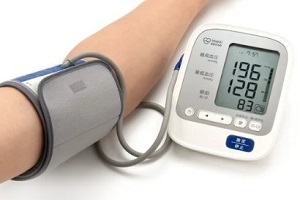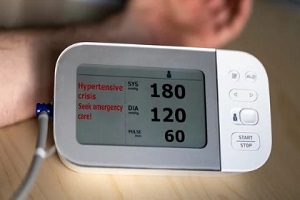 Suppose you’ve been diagnosed with hypertension, also known as high blood pressure. In that case, it’s important to find ways to keep it under control. Hypertension may not cause symptoms, but it can result in health problems if ignored.
Suppose you’ve been diagnosed with hypertension, also known as high blood pressure. In that case, it’s important to find ways to keep it under control. Hypertension may not cause symptoms, but it can result in health problems if ignored.
Here are some tips for coping with hypertension through lifestyle changes and at-home monitoring.
Adopting a Heart-Healthy Lifestyle
Making healthy lifestyle choices is key to managing hypertension. For many people, these changes alone can optimize blood pressure without medication. The American Heart Association advises:
- Losing excess weight. Shedding just 10 pounds can make a difference
- Quitting cigarettes and avoiding secondhand smoke, which raises blood pressure
- Eating more fruits, veggies, whole grains, lean protein, nuts and seeds. These foods provide nutrients that support healthy blood pressure
- Limiting sodium to 2,300 mg daily maximum. Cutting just 500 mg of salt per day can lower blood pressure
- Getting regular cardio exercise such as fast walking, biking, or swimming for half an hour most days. Activity helps control weight and blood pressure
- Drinking alcohol in moderation – at most two drinks daily for men and one for women. One drink is 1.5 oz spirits, 5 oz wine, or 12 oz beer
In general, hypertension shouldn’t restrict normal activities. Stay active with moderate exercise. Some providers recommend avoiding intense thrills or competitive sports that spike blood pressure. Avoid overexertion if you have chest pain or experience shortness of breath.
Monitoring at Home
Measuring your blood pressure regularly at home gives your provider important data to determine whether treatment works. The AHA advises home monitoring for all people with hypertension, ideally using an automatic arm cuff monitor for consistency.
Today’s technology offers many ways to record and digitally track home blood pressure readings. Smartphone apps, smartwatches, laptops, and other devices can save blood pressure data if connected wirelessly to a blood pressure monitor.
Some monitors let you transmit readings directly to your doctor’s office or health insurance provider, which can be helpful for closely managing unstable or fluctuating blood pressure.
Knowing Your Triggers
Pay attention to any lifestyle factors, foods, or situations that spike your blood pressure. For instance, some people notice an increase in their blood pressure after consuming salty foods, sugar, caffeine, or alcohol. Others may experience a rise in response to stress, not getting enough sleep, being inactive, or being out in very hot or cold weather.
Managing Stress
 Any chronic health condition can take an emotional toll after some time. Having to regularly take medications, monitor your condition, and make ongoing lifestyle changes inevitably leads to some degree of added stress. Finding healthy ways to manage stress makes living with hypertension much more sustainable.
Any chronic health condition can take an emotional toll after some time. Having to regularly take medications, monitor your condition, and make ongoing lifestyle changes inevitably leads to some degree of added stress. Finding healthy ways to manage stress makes living with hypertension much more sustainable.
Chronic stress seems to play a contributing role in causing hypertension for some people. The scientific evidence for this link is still being investigated. Still, common sense tells us that unchecked stress over many years will unlikely benefit blood pressure.
Managing stress can involve:
- Counseling
- Learning stress management techniques
- Adopting a more mindful attitude
- Taking medication
- Making tangible changes to demanding life circumstances
Finding realistic ways to lower daily stress can provide tremendous benefits beyond improving hypertension.
Social Considerations
One positive aspect of hypertension is that it does not usually impair one’s social life in significant ways, as some other health conditions can. People with hypertension do not have to miss out on social engagements, travel plans, or recreational activities.
However, making certain lifestyle modifications to control blood pressure can necessitate some adjustments to social habits. For example, if you used to meet up with friends for drinks frequently, you will now need to abstain or cut back on your alcohol intake.
Seeking Support
Although support groups specifically for hypertension may be hard to find, you may be able to locate one for any underlying conditions that are causing your high blood pressure, whether online or in-person meetings.
Connecting with peers who understand the day-to-day challenges of managing the same condition provides a valuable sounding board and motivation.
 You can also try discreetly asking trusted friends or family members if they, too, have experience coping with hypertension or look for online communities focused on healthy living with hypertension.
You can also try discreetly asking trusted friends or family members if they, too, have experience coping with hypertension or look for online communities focused on healthy living with hypertension.
Let Imperial Center Family Medicine Help You Cope with Hypertension
Managing hypertension takes dedication and lifestyle adjustments, but you can cope by adopting healthy habits, monitoring your blood pressure, and managing stress.
Suffering from a chronic condition isn’t easy. It requires you to be proactive and consistent, but that’s also the good news since it will enable you to continue living an amazing life.
Imperial Center Family Medicine’s team has a wealth of expertise and experience in helping patients manage hypertension through evidence-based care, compassion, and support. Contact us today at 919-873-4437 or online to see how we can help you cope with your hypertension.
